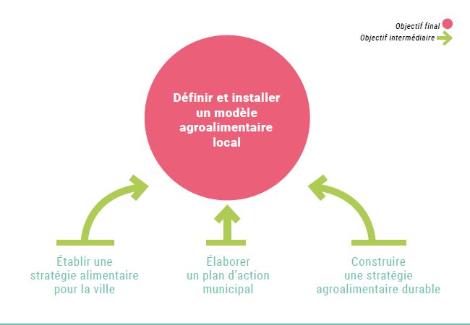Sustainability of the agri-food system in Vitoria-Gasteiz
Integration in the municipal action plan
January 2019
Fondation Daniel et Nina Carasso (FDNC)
Towards a Europe of territorial food systems?
This study is extracted from the analysis of twenty-two French and Spanish projects related to new food models, all highlighting different challenges.
In Spain, governance is being built, while French food systems are looking for solutions to change scale. But in both countries, accessibility remains the weak link. In the Basque Country, the Vitoria-Gasteiz agrifood strategy starts with a participatory diagnosis of the agricultural supply and demand for food, and then establishes the guidelines for the action plan.
The project is part of the process of developing the sustainable agro-food strategy of Vitoria-Gasteiz. The aim of the municipality is to move towards a local agri-food model capable of responding to current environmental and social challenges. After several years of debate motivated by the demands of civil society, a framework document has been drawn up by consensus between the participating entities and the City Council. The administration is currently drawing up a municipal action plan to carry out different actions associated with sustainable agricultural production and quality food.
At the same time, the city aims to become a driving force to involve and collaborate with the different actors in the food chain who are committed to virtuous production and consumption patterns. The role of the town hall is to facilitate the actions of farmers, families and school canteens to introduce local and organic products into school menus. The main player in the project is the Vitoria-Gasteiz Centre for Environmental Studies, an autonomous municipal body that oversees the sustainable development of the city. The process is based on the participation of different collectives linked to ecological agriculture, agrarian unions, social companies, purchasing groups, environmental or international cooperation and fair trade organisations. The project aims to create a self-managed organisation for the marketing of local and organic products for school canteens, using a local agri-food model.

Vitoria-Gasteiz, Spain
In the Spanish Basque Country, within the province of Alava, the city of Vitoria-Gasteiz is an ancient, dense medieval city surrounded by sixty-four hamlets. Beyond it lies a belt of farmland and natural vegetation. A total of 41% of the municipality is arable. Organic farming is highly developed and the majority of the crops produced in this agricultural belt only use rainwater.
Vitoria-Gasteiz was elected European Green Capital in 2012 and received a special mention for its « green ring »: a network of parks and green spaces that surround the city, making the transition to agricultural land. Vitoria’s population is predominantly ageing and male.
Long-term public commitment
The city of Vitoria-Gasteiz is developing participatory processes to build its food policy. This openness facilitates the adoption of its projects by elected officials. Its success is based on identifying the right interlocutor and adapting its messages. The municipality has created a dedicated post to ensure the coordination of food policy: the strategy is gaining in autonomy, but the amount of work limits consultation. The creation of an interdepartmental food-processing working group, with a reference person, has made it easier to open up to the various players in the chain.